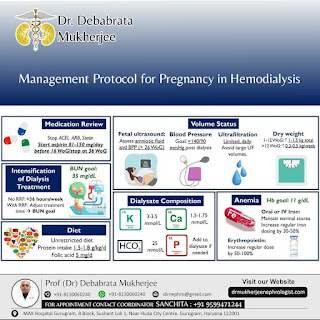Management of the pregnant dialysis patient
- Get link
- X
- Other Apps
Managing pregnancy in women undergoing hemodialysis requires a multidisciplinary approach involving nephrologists, obstetricians, and other healthcare professionals. Here are some key aspects of the management protocol for pregnancy in women on hemodialysis:
Preconception Counseling:
- Encourage women on hemodialysis who are contemplating pregnancy to undergo preconception counseling.
- Assess and optimize the woman's overall health, including blood pressure control, anemia management, and nutritional status.
Medication Review:
- Review medications to ensure that they are compatible with pregnancy.
- Adjust or change medications as needed, avoiding teratogenic drugs.
Hemodialysis Schedule:
- Optimize the hemodialysis schedule to ensure adequate clearance of waste products and fluid removal.
- Frequent and longer hemodialysis sessions may be necessary during pregnancy.
Blood Pressure Control:
- Strictly control blood pressure to reduce the risk of maternal and fetal complications.
- Monitor blood pressure regularly and adjust antihypertensive medications as needed.
Anemia Management:
- Manage anemia with erythropoietin-stimulating agents and iron supplementation.
- Monitor hemoglobin levels regularly.
Nutritional Support:
- Ensure adequate nutrition, including folic acid supplementation.
- Monitor nutritional status and adjust dietary recommendations accordingly.
Monitoring and Surveillance:
- Perform regular maternal and fetal monitoring, including ultrasound assessments.
- Monitor for complications such as preeclampsia, gestational diabetes, and intrauterine growth restriction.
Team Collaboration:
- Foster collaboration between the nephrology and obstetrics teams.
- Develop a care plan that outlines the roles and responsibilities of each healthcare professional involved in the patient's care.
Patient Education:
- Educate the patient about the potential risks and challenges of pregnancy on hemodialysis.
- Discuss the importance of adherence to medical recommendations and regular follow-up appointments.
Delivery Planning:
- Plan for delivery in a hospital with expertise in managing high-risk pregnancies.
- Consider the timing and mode of delivery based on maternal and fetal well-being.
Postpartum Care:
- Provide postpartum care, including monitoring of renal function and adjustment of medications.
- Address any complications that may arise during the postpartum period.
It's essential for healthcare providers to tailor the management plan to the individual needs and circumstances of each patient. Regular communication and coordination among the healthcare team members are crucial for optimizing outcomes for both the mother and the baby.
For more Details:
Contact: Dr. Debabrata Mukherjee, Max Hospital
Best Nephrologist in Delhi
https://drmukherjeenephrologist.com/
- Get link
- X
- Other Apps


Comments
Post a Comment